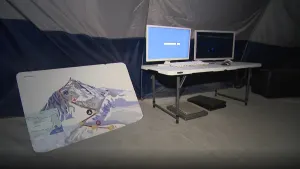More Stories
Wildlife rehabilitators call this time of the year “baby season,” because thousands of baby animals will find themselves needing care. But there is one type of animal where the mothers are most often in danger – turtles.
There is a new arrival at the Mercer County Wildlife Center in Titusville – a 30-pound snapping turtle that was hit by a car.
Several animal control officers tell News 12 New Jersey this week that they have been extremely busy with snapping turtle calls this time of year. The animals emerge from the ponds where they live to lay their eggs and often wind up in yards and other places where humans don’t know what to do with them.
“If you see them, just leave them alone. They’re not going to bother you. They’re trying to do what they’ve been doing for millions of years – lay their eggs,” says Mercer County Wildlife Center director Diane Nickerson. “Once their eggs are laid, they’ll go back to the water. They don’t return to care for their young. The eggs will hatch in about 45 days and the young will find their way to the water as well. Nobody needs your help. They all know how to handle it.”
Snapping turtles’ names are no accident. They can take someone’s finger off. The only time a person might want to go near one is to get it off the road. Wildlife experts say to always move turtles in the direction in which they were heading and to only pick up a turtle from the back of its top shell.
“Don’t ever pick them up by their tail. That will fracture their spine,” Nickerson says.
Nickerson showed News 12 the center’s “Shell Shack” where about a half dozen snapping turtles were recovering from injuries. There are also some Eastern box turtles and other species of turtles. Each one is X-rayed for injuries and to see if they are carrying eggs.
“That’s something that we do with all the turtles that come in this time of year that have been hit by cars. Most of them are females, because they’re all laying eggs,” Nickerson says.
If the turtle has eggs, they are buried in a sandy spot to incubate and the babies are returned to the wild once they hatch. Snapping turtles can live about 40 years – some have lived as long as 100 years.
Turtles heal more slowly than other animals. Most will spend the summer at the center before being released in the fall.
More from News 12
1:31

What's Cooking: Uncle Giuseppe's Marketplace's prime rib roast
1:30

Looking for a road trip? Check out Big Snow at American Dream in East Rutherford
1:27

What's Cooking: Uncle Giuseppe's quiche lorraine
2:34

Guide: Safety tips to help prevent home burglaries
2:19

Guide: Safety measures to help prevent fires and how to escape one
2:36
